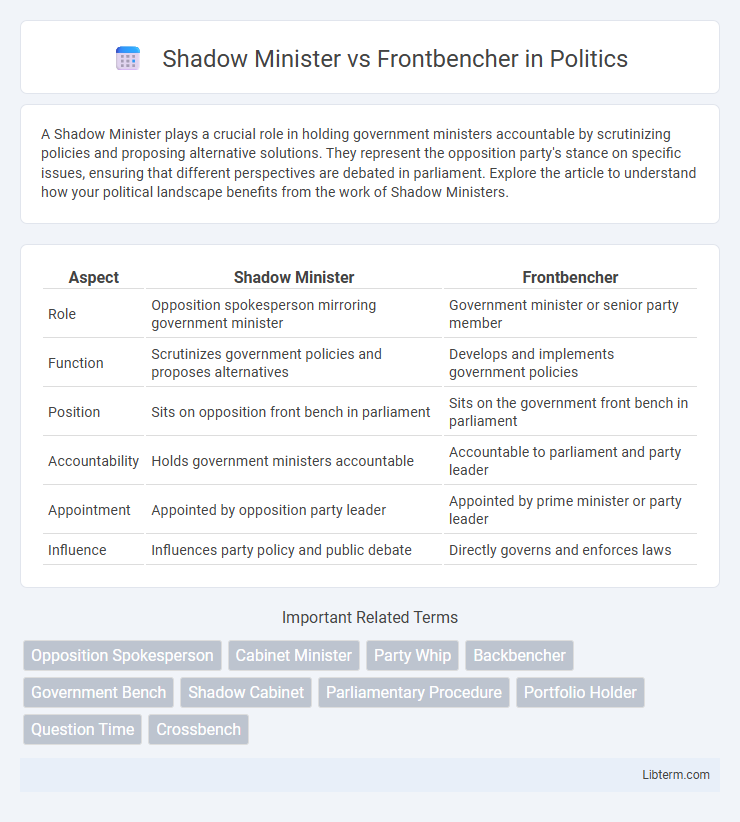A Shadow Minister plays a crucial role in holding government ministers accountable by scrutinizing policies and proposing alternative solutions. They represent the opposition party's stance on specific issues, ensuring that different perspectives are debated in parliament. Explore the article to understand how your political landscape benefits from the work of Shadow Ministers.
Table of Comparison
| Aspect | Shadow Minister | Frontbencher |
|---|---|---|
| Role | Opposition spokesperson mirroring government minister | Government minister or senior party member |
| Function | Scrutinizes government policies and proposes alternatives | Develops and implements government policies |
| Position | Sits on opposition front bench in parliament | Sits on the government front bench in parliament |
| Accountability | Holds government ministers accountable | Accountable to parliament and party leader |
| Appointment | Appointed by opposition party leader | Appointed by prime minister or party leader |
| Influence | Influences party policy and public debate | Directly governs and enforces laws |
Introduction to Parliamentary Roles
Shadow Ministers are members of the opposition party assigned to scrutinize and challenge specific government ministers, offering alternative policies and holding the government accountable. Frontbenchers refer broadly to senior Members of Parliament who occupy prominent positions, including both government ministers and opposition spokespeople. These roles are central to parliamentary proceedings, influencing legislative debates and party strategy.
Defining the Shadow Minister
A Shadow Minister is a member of the opposition party assigned to scrutinize and challenge the policies and actions of a specific government minister's portfolio. They develop alternative policies, hold the government accountable, and prepare their party for potential governance. While all Shadow Ministers are frontbenchers, frontbenchers also include government ministers, making the term broader than just opposition roles.
Who is a Frontbencher?
A frontbencher is a senior member of a legislative assembly who holds a prominent position within their party, typically seated on the front row in the parliamentary chamber. Frontbenchers include government ministers and opposition spokespeople responsible for specific policy areas and play a key role in debates and decision-making. Their visibility and influence distinguish them from backbenchers and make them essential to party strategy and parliamentary leadership.
Key Responsibilities of Shadow Ministers
Shadow Ministers hold the critical responsibility of scrutinizing and challenging the policies and actions of their corresponding government Frontbenchers, ensuring accountability within parliamentary systems. They develop alternative policies and prepare to assume ministerial roles if their party gains power, maintaining readiness to influence governance effectively. Their role includes articulating opposition viewpoints during debates and engaging with media to communicate party positions clearly.
Duties and Influence of Frontbenchers
Frontbenchers are key members of the ruling party or coalition who hold official government positions such as ministers or junior ministers, responsible for implementing policies and managing departments. Their duties involve shaping legislation, overseeing public services, and representing their ministries in parliamentary debates, which gives them substantial influence over government decisions and agenda-setting. In contrast, Shadow Ministers serve in the opposition, scrutinizing and challenging the policies and actions of frontbenchers to hold the government accountable.
Shadow Minister vs Frontbencher: Main Differences
A Shadow Minister is a member of the opposition party assigned to scrutinize and challenge the policies of a specific government minister, whereas a Frontbencher is a senior member of either the government or opposition party who sits on the front bench in parliament, typically holding a ministerial or spokesperson role. Shadow Ministers form the Shadow Cabinet and focus exclusively on critiquing government portfolios, while Frontbenchers include both government ministers responsible for policy implementation and opposition spokespeople. The key difference lies in their roles: Shadow Ministers serve as counterparts to government ministers from the opposition, whereas Frontbenchers encompass all leading parliamentarians with significant decision-making or policy influence.
The Role in Shaping Policy Debate
The Shadow Minister plays a crucial role in shaping policy debate by scrutinizing government actions and proposing alternative policies within the opposition party, ensuring accountability and innovation in governance. Frontbenchers, both in government and opposition, lead their party's contributions to parliamentary debates, influencing legislative priorities and framing public discourse on key issues. Their combined efforts drive the evolution of policy by presenting contrasting viewpoints and expert insights during parliamentary sessions.
Selection and Appointment Process
Shadow Ministers are selected by the leader of the opposition party to scrutinize specific government departments, reflecting the party's policy priorities and expertise. Frontbenchers, whether in government or opposition, are appointed based on their seniority, experience, and political influence within the party, with government frontbenchers typically chosen by the Prime Minister. The selection and appointment processes for both roles emphasize alignment with party strategy and the ability to effectively represent and challenge parliamentary issues.
Impact on Party Strategy and Public Image
Shadow Ministers shape party strategy by scrutinizing government policies and proposing alternatives, directly influencing public perception through media engagement and parliamentary debates. Frontbenchers, often part of the ruling party or government, drive policy implementation and communicate official positions, reinforcing the party's credibility and authority. The dynamic roles of Shadow Ministers and Frontbenchers collectively impact party strategy coherence and public image clarity, affecting voter confidence and electoral outcomes.
Conclusion: Importance in Parliamentary Democracy
Shadow Ministers play a crucial role in a parliamentary democracy by holding the government accountable and offering alternative policies, ensuring a dynamic and responsive political environment. Frontbenchers, as senior members of the governing party or coalition, drive legislative agendas and policy implementation, maintaining government stability and coherence. Together, Shadow Ministers and Frontbenchers strengthen democratic governance by fostering debate, transparency, and effective policy-making.
Shadow Minister Infographic

 libterm.com
libterm.com